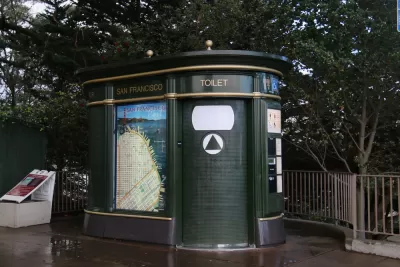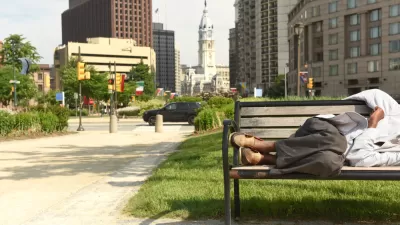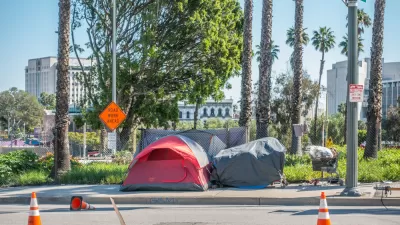The city is planning to remove the hundreds of public toilets and hand-washing stations installed during the pandemic. But the need for them isn't going away.

Without access to public toilets, writes the Los Angeles Times editorial board, "the unhoused have no choice but to carry out their most necessary and private of bodily functions on public streets and sidewalks." Thus, the city should continue its efforts to provide adequate public bathrooms for its unhoused population.
"A 2017 study of bathroom availability found that the number of toilets available to 1,800 homeless people on skid row at night — nine — was fewer than the United Nations High Commissioner for Refugees’ standard of one toilet for every 20 people in a refugee camp." Yet, despite installing 363 hand-washing stations and 182 portable toilets during the COVID-19 pandemic, the city is now removing all of them, citing concerns about safety and vandalism.
"The city insists that these installations were only intended to stay in place during the height of the pandemic as a public health measure. But COVID-19 is still a danger to the homeless population." Not to mention the fact that the need for toilets isn't going anywhere after the pandemic.
We get it. Bathrooms are complicated. They get vandalized. What the city doesn’t seem to get is how urgently they are needed. Apparently residents have complained about the porta-potties near encampments — as if the sight of them signals that the city has normalized the existence of homeless encampments. Not at all. It signals that the city thinks it’s bad public health to normalize urinating and defecating on streets and sidewalks and in people’s yards. And that’s what happens when there isn’t enough housing and shelter and when there aren’t enough public bathrooms.
The board offers solutions including automated toilets that are more resistant to damage and vandalism and paying facilities like YMCA centers and churches to make their bathrooms available to unhoused people. As far as the remaining toilets at encampments, the board writes, "let them stay there — until the city actually comes up with another viable plan for how to get people to a bathroom."
FULL STORY: L.A. shouldn’t remove portable toilets from homeless encampments

Alabama: Trump Terminates Settlements for Black Communities Harmed By Raw Sewage
Trump deemed the landmark civil rights agreement “illegal DEI and environmental justice policy.”

Study: Maui’s Plan to Convert Vacation Rentals to Long-Term Housing Could Cause Nearly $1 Billion Economic Loss
The plan would reduce visitor accommodation by 25% resulting in 1,900 jobs lost.

Planetizen Federal Action Tracker
A weekly monitor of how Trump’s orders and actions are impacting planners and planning in America.

Waymo Gets Permission to Map SF’s Market Street
If allowed to operate on the traffic-restricted street, Waymo’s autonomous taxis would have a leg up over ride-hailing competitors — and counter the city’s efforts to grow bike and pedestrian on the thoroughfare.

Parklet Symposium Highlights the Success of Shared Spaces
Parklets got a boost during the Covid-19 pandemic, when the concept was translated to outdoor dining programs that offered restaurants a lifeline during the shutdown.

Federal Homelessness Agency Places Entire Staff on Leave
The U.S. Interagency Council on Homelessness is the only federal agency dedicated to preventing and ending homelessness.
Urban Design for Planners 1: Software Tools
This six-course series explores essential urban design concepts using open source software and equips planners with the tools they need to participate fully in the urban design process.
Planning for Universal Design
Learn the tools for implementing Universal Design in planning regulations.
Caltrans
Smith Gee Studio
Institute for Housing and Urban Development Studies (IHS)
City of Grandview
Harvard GSD Executive Education
Toledo-Lucas County Plan Commissions
Salt Lake City
NYU Wagner Graduate School of Public Service





























